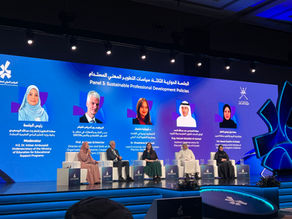Global Schools Program Participates in the World Environmental Education Congress (WEEC)
- SDSN Youth

- Feb 8, 2024
- 3 min read
By Raquel Armendariz, Communications Project Lead at Global Schools
From January 29th to February 2nd, the Global Schools Program (GSP) participated in the 12th World Environmental Education Congress (WEEC) and the parallel youth-centered conference, YEEC, which aims to engage youth in Environmental Education (EE). This year’s WEEC, hosted by the Environmental Agency-Abu Dhabi (EAD) in the United Arab Emirates (UAE), aimed to address pressing environmental challenges and inspire collective action for a more sustainable and equitable world.
To kick off the four-day congress, Global Schools representatives Alexa Rose Pettinari (Advocacy Project Officer) and Raquel Armendariz Sucunza (Communications Project Lead) attended the opening ceremony. The opening plenary panel featured an array of inspiring speakers, including HE Shaikha Al Dhaheri, Secretary General of the EAD; Mario Salomone, Secretary-General of WEEC Secretariat; and Elizabeth Wathuti, Kenyan Youth Activist, Founder & Executive Director of Green Generation Initiative. Following the starting ceremony and throughout the remainder of the Congress, delegates had the opportunity to participate actively in several sessions that covered topics such as aligning EE and Education for Sustainable Development (ESD) to tackle the triple planetary crisis; promoting AI and technological advancements to achieve sustainability; and discussing the role of indigenous communities in rethinking EE, among others. Global Schools was proud to participate in these panels and connect with delegates from partner organizations such as the Mohamed VI Foundation for Environmental Protection and the Ban Ki-Moon Centre for Global Citizens.
Notably, during the second day at YEEC, Communications Project Lead Raquel Armendariz joined a panel titled “Content Creation on Environmental Education,” where she discussed the importance of content creation and using social media to convey meaningful, reliable, and relatable messages on the importance of EE and how to implement EE in local communities.

In addition, on day three, the Global Schools Program was honored to facilitate two sessions at YEEC, a global cafe on “Environmental Education: Programs Around the World: Achievements & Challenges” and a workshop on “Building SMART Communities: Setting Goals for Global Collaboration.” First, the global cafe served as a movement to engage with international peers, dive deep into the work of our Advocacy Program, and discuss how to better create a positive impact.

Second, the workshop provided participants with an opportunity to understand the importance of tackling global issues from their local communities by exploring how the SMART goals framework can foster collaboration and be used to advocate for environmentally-friendly solutions.


The last day of WEEC and YEEC served as a moment of reflection on the incredible journey and a celebration of the enlightening discussions held during the previous days. However, the most notable part was the launch of the Abu Dhabi Road Map, which compiles recommendations from the Delegates and serves as a compelling call to elevate the aspiration of EE and ESD with an unparalleled sense of urgency, aiming to achieve significant milestones by 2030. Global Schools is proud to have contributed to the youth empowerment recommendations by joining the rest of the youth delegates in drafting youth recommendations, led by Advocacy Project Officer Alexa Rose Pettinari, who was in charge of editing and played a significant role in representing the youth community.
The Global Schools Program is grateful to have been invited to this incredible event and to have had the chance to showcase our mission of advancing EE on a global scale. We look forward to future collaborations and events to showcase the transformative power of youth leadership for the 2030 Agenda.
For any inquiries, please contact globalschools@unsdsn.org

















Comments